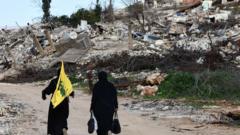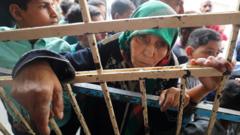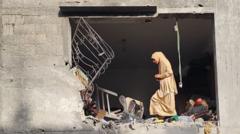Military Strategies and Hostage Negotiations Intensify
# Escalation in Gaza: Israel's Military Aims and Broader Implications

# Escalation in Gaza: Israel's Military Aims and Broader Implications
As figures in Israel redefine military objectives, tensions in Gaza continue to escalate, raising concerns over the region's future.
In the unfolding conflict in Gaza, Israel's leadership has outlined a series of evolving military objectives amid ongoing operations targeting Hamas. The primary aim remains to pressure the militant group into releasing numerous hostages, yet the landscape is changing.
Israel has ramped up its military offensive, with Israeli Prime Minister Benjamin Netanyahu publicly stating the intention to "move up a gear"—a phrase underscoring an escalation in ground operations. This rhetoric coincides with military operations in eastern Gaza City, where evacuation warnings have been issued to civilians, indicating a looming ground assault.
Moreover, Netanyahu suggested a broader strategy: the objective to dismantle Hamas's military capacity and challenge its governance—a goal that has yet to be realized after more than a year of confrontations. Defense Minister Israel Katz has reiterated the importance of securing territory to safeguard Israeli border towns, hinting at a potential for a prolonged military presence in the region.
In recent media, analysts have pointed out the ambiguity surrounding Israel's overall strategy, with many questioning how these objectives will affect both the local populace and broader regional stability. The urgency of the situation further deepens with the military asserting that the humanitarian crisis within Gaza is compounding challenges faced by both civilians and military operations.
In the latest developments, aid organizations have reported difficulties in providing relief due to the intense military activities and the continued hostilities between Israel and Hamas. The prospect of peace negotiations seems increasingly distant, leaving the fate of the hostages and the people of Gaza in a precarious position as the conflict persists.
Israel has ramped up its military offensive, with Israeli Prime Minister Benjamin Netanyahu publicly stating the intention to "move up a gear"—a phrase underscoring an escalation in ground operations. This rhetoric coincides with military operations in eastern Gaza City, where evacuation warnings have been issued to civilians, indicating a looming ground assault.
Moreover, Netanyahu suggested a broader strategy: the objective to dismantle Hamas's military capacity and challenge its governance—a goal that has yet to be realized after more than a year of confrontations. Defense Minister Israel Katz has reiterated the importance of securing territory to safeguard Israeli border towns, hinting at a potential for a prolonged military presence in the region.
In recent media, analysts have pointed out the ambiguity surrounding Israel's overall strategy, with many questioning how these objectives will affect both the local populace and broader regional stability. The urgency of the situation further deepens with the military asserting that the humanitarian crisis within Gaza is compounding challenges faced by both civilians and military operations.
In the latest developments, aid organizations have reported difficulties in providing relief due to the intense military activities and the continued hostilities between Israel and Hamas. The prospect of peace negotiations seems increasingly distant, leaving the fate of the hostages and the people of Gaza in a precarious position as the conflict persists.





















